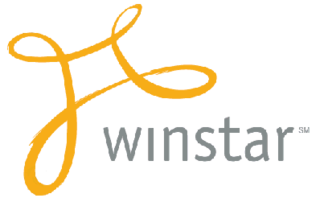
Fine Air was an international cargo airline that operated from 1989 to 2002, when it was renamed Arrow Air following its bankruptcy and acquisition. It operated Douglas DC-8 and Lockheed L-1011 type jets to destinations in Central America, South America and the Caribbean from Miami International Airport.
Crazy Eddie was a consumer electronics chain in the Northeastern United States. The chain was started in 1971 in Brooklyn, New York, by businessmen Eddie and Sam M. Antar, and was previously named ERS Electronics. The chain rose to prominence throughout the Tri-State area as much for its prices as for its memorable radio and television commercials, featuring a frenetic, "crazy" character played by radio DJ Jerry Carroll. At its peak, Crazy Eddie had 43 stores in four states and reported more than $300 million in sales.

Gateway, Inc., previously Gateway 2000, Inc., was an American computer company originally based in Iowa and South Dakota. Founded by Ted Waitt and Mike Hammond in 1985, the company developed, manufactured, supported, and marketed a wide range of personal computers, computer monitors, servers, and computer accessories. At its peak in the year 2000, the company employed nearly 25,000 worldwide. Following a seven-year-long slump, punctuated by the acquisition of rival computer manufacturer eMachines in 2004 and massive consolidation of the company's various divisions in an attempt to curb losses and regain market share, Gateway was acquired by Taiwanese hardware and electronics corporation Acer, in October 2007 for US$710 million.

Tech Data Corporation was an American multinational distribution company specializing in IT products and services headquartered in Clearwater, Florida. It merged with competitor Synnex to form TD Synnex. Synnex is to be the primary owner. Tech Data provided a broad range of product lines, logistics capabilities and value-added services that enable technology manufacturers and resellers, such as Google, Apple, Cisco, Dell, Fortinet, Hewlett Packard Enterprise, HP Inc., IBM, Lenovo, LG, Microsoft, Sony, Trend Micro, Viewsonic, TP-Link and VMware, to deploy IT solutions.
Soyo Group, Inc., often shortened to Soyo, was a United States-based electronics company. Established in 1985, Soyo was a provider of consumer electronics such as LCD HDTVs, home theater furniture, Bluetooth headsets, portable storage devices, computer monitors, computer motherboards, computer cases, and computer peripheral devices.
Community Health Systems (CHS) is a Fortune 500 company based in Franklin, Tennessee. It was the largest provider of general hospital healthcare services in the United States in terms of number of acute care facilities. In 2014, CHS had around 200 hospitals, but the number had declined to around 85 in 2021.

Essendant Inc., formerly known as United Stationers, is a national wholesale distributor of office supplies, with consolidated net sales of $5.3 billion. Essendant stocks over 160,000 items, including traditional office products, office furniture, janitorial and break room supplies, and technology products. Essendant is headquartered in Deerfield, Illinois, and also has operations in Dubai, United Arab Emirates (UAE).

Hastings Entertainment was an American retail chain that sold books, movies, music, and video games and functioned as a video rental shop. As of 2016 it had 126 superstores, which were mainly located in the South Central United States, Rocky Mountain States, and in parts of the Great Plains and Midwestern states. Hastings Entertainment stores were also located in many college towns in the U.S. Hastings Entertainment was headquartered in Amarillo, Texas.

Mylex Corporation was an American computer company active from 1983 to 1999. The company mainly produced peripherals and expansion cards for personal computers—chiefly the IBM Personal Computer—for the bulk of its existence, although it also produced complete motherboards. In the mid-1990s the company focused on designing and manufacturing RAID controllers, eventually cornering 75 percent of the RAID controller market. In 1999, the company was acquired by and made a subsidiary of IBM for approximately $240 million. In 2002, IBM sold their Mylex division to LSI Logic for an undisclosed amount.
Computer 2000 was Europe's leading provider of IT products to resellers between 1983 and its merger with Tech Data in 1998.

iQon Technologies Ltd was a manufacturer of personal and notebook computers and consumer electronics based in Dundalk, Louth, Ireland. The company marketed computers through retailers across the United Kingdom and exported to Europe and North Africa.

Winstar Communications was an American telecommunications company that provided broadband services to business customers. Winstar owned and operated a broadband network in 60 major markets in the United States, including each of the top 30 U.S. markets and ten markets internationally in Europe, Asia, and Latin America.
InnoVida was a manufacturer of building materials, founded by businessman Claudio Osorio. It entered bankruptcy in 2011, one in a string of companies taken into bankruptcy under Osorio's leadership.

Claudio Eleazar Osorio is a Venezuelan convicted felon and fraudster previously based in Star Island, Miami, Florida. He rose to prominence in the late 1990s due to the expansion of his company CHS Electronics, formerly a leading international distributor of microcomputers, peripherals, and software that went bankrupt after accounting scandals. The next company Osorio founded, Innovida, also went through receivership and, ultimately, bankruptcy. Osorio faced five separate lawsuits for fraud after investors claimed that millions had disappeared from Innovida's accounts. He and his wife, Amarilis, were also accused of defrauding a charitable effort to build homes in Haiti after the 2009 earthquake. Osorio filed for bankruptcy in 2011. In December 2012, Osorio was arrested and charged for his involvement in a $40 million fraud. In 2013 he was sentenced to 12-1/2 years in prison for fraud. Osorio was released from Federal prison on 13 January 2022 after serving 9 years. He is assigned Federal Bureau of Prisons inmate number 01273-104.
Lifeboat Associates was a New York City company that was one of the largest microcomputer software distributors in the late 1970s and early 1980s. Lifeboat acted as an independent software broker marketing software to major hardware vendors such as Xerox, HP and Altos. As such Lifeboat Associates was instrumental in the founding of Autodesk and also financed the creation of PC Magazine.

SCO Forum was a technical computer conference sponsored by the Santa Cruz Operation (SCO), briefly by Caldera International, and later The SCO Group that took place during the 1980s through 2000s. It was held annually, most often in August of each year, and typically lasted for much of a week. From 1987 through 2001 it was held in Santa Cruz, California, on the campus of the University of California, Santa Cruz. The scenic location, amongst redwood trees and overlooking Monterey Bay, was considered one of the major features of the conference. From 2002 through 2008 it was held in Las Vegas, Nevada, at one of several hotels on the Las Vegas Strip. Despite the name and location changes, the conference was considered to be the same entity, with both the company and attendees including all instances in their counts of how many ones they had been to.
3D Microcomputers Wholesale and Distribution, Inc., often referred to as 3D Microcomputers or 3D Micro, was a computer company based in Markham, Ontario. The company was among the top five personal computer vendors in Canada in the mid-1990s. The company was partially owned by Hong Kong–based computer manufacturer PC Chips for several years; many of the parts for 3D Micro's computers were of overseas origin.

TriGem Computer Co., Ltd., was a South Korean personal computer manufacturer and technology company. Established in 1980, TriGem was the first Korean company dedicated to manufacturing computer systems. It delivered Korea's first microcomputer in 1981 and the first Korean IBM PC compatibles in 1984. From that point until its breakup in 2010, it alternated between the first- and second-largest computer manufacturer in South Korea, competing with Samsung Electronics.

Boca Research, Inc., later Inprimis, Inc., was an American computer company based in Boca Raton, Florida, and active between 1985 and 2002. The company manufactured a variety of expansion cards for the IBM PC and compatible systems, including memory cards, networking cards, sound cards, and graphics cards. Once a major player in the computer networking market, being the fourth-largest manufacturer of modems in 1996, Boca Research abandoned the PC hardware market entirely amid falling market share and manufactured set-top boxes in the last years of its existence.

Reveal Computer Products, Inc., was a short-lived American computer peripheral manufacturer active from 1992 to 1996. It was established as a subsidiary of Packard Bell Electronics, an American computer company. The company was once a major player in the IBM PC peripheral market, with annual sales peaking above the US$200 million mark. It went bankrupt in 1996 after an aborted $65-million merger with Creative Technology.











